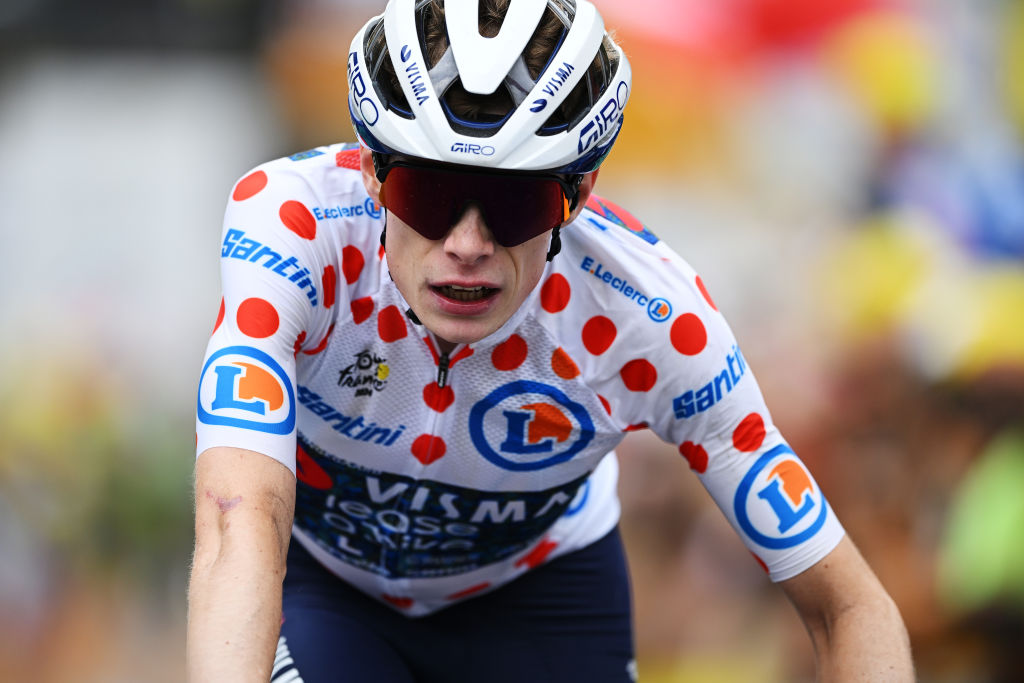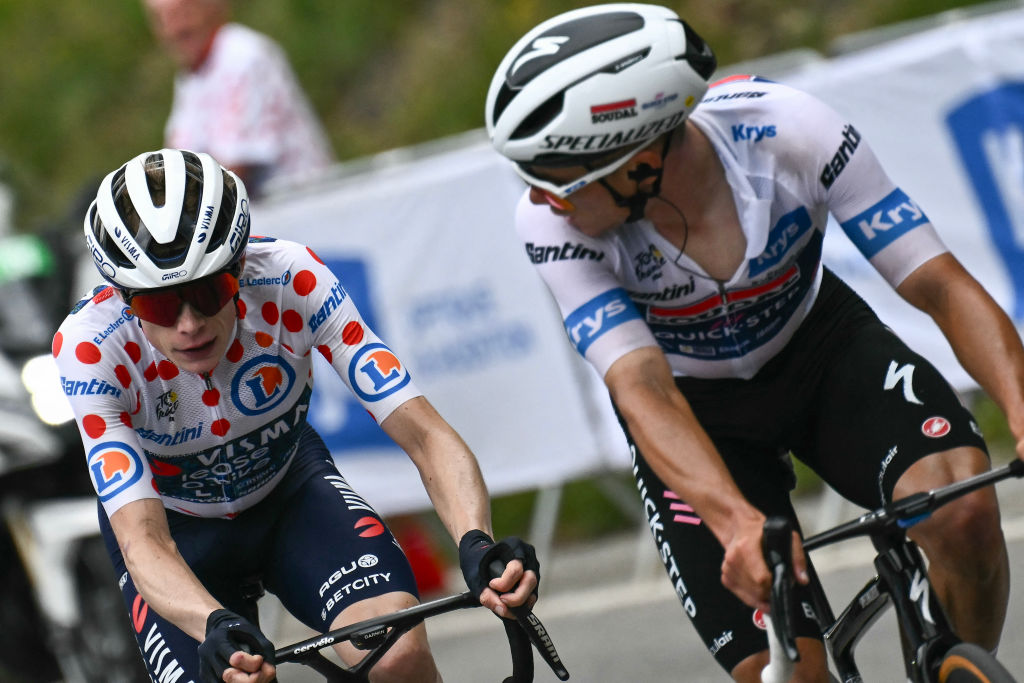'The fight for the win is over' – Jonas Vingegaard concedes Tour de France title to Tadej Pogačar at Isola 2000
Dane now 5:03 behind after Visma-Lease a Bike’s Bonette plan stalls

Past the finish line at Isola 2000, Jonas Vingegaard stepped away from the Tour de France for a moment and into the arms of his wife Trine. The defence of his title ended further down the mountain, but defeat takes nothing from the meaning of his journey over the past three months, from a hospital bed in Vitoria to a dizzying contest for the yellow jersey.
After a time, Matteo Jorgenson made his way over to Vingegaard and draped a consoling arm around his team leader’s shoulder. The American endured heartbreak of his own on Friday, missing out on stage victory when he was caught and passed by a rampant Tadej Pogačar near the summit, but his only thought here was to offer a salve to the dejection of Vingegaard, who now lies 5:03 down overall. “Hey, I’m proud of you,” Jorgenson said. “You gave everything, that’s all that matters, really.”
Wilco Kelderman was next in line to offer his solidarity, and Vingegaard managed a thin smile of gratitude when he saw his Visma-Lease a Bike teammate approach. “Thank you, Wilco,” he said carefully. “Good job today.”
It wasn’t supposed to end like this. Vingegaard began the day 3:11 behind Pogačar but still nurturing the ambition – or more accurately, the dream – of snatching the yellow jersey from his rival. Stage 19, which brought the Tour over the Col de Vars and the mighty Cime de la Bonette, offered the terrain for him to do so.
As they had done on the Col du Granon stage two years ago, Visma-Lease a Bike had devised a special playbook for the occasion, dispatching Kelderman and Jorgenson up the road in the early break, which was propelled clear by another of their number, Christophe Laporte. The plan was obvious, but its execution was provisional.
“If I could just print out my plan and then execute it on the PlayStation, that would have been the plan,” directeur sportif Grischa Niermann said afterwards. “But it didn’t work.”
The intention was for Vingegaard to attack Pogačar and bridge up to his teammates on the upper reaches of the Bonette, some 2,800m above sea level, but lightning never seemed likely to strike twice here. The strength of Visma’s idea could not possibly compensate for the deficits in Vingegaard’s energy.
Get The Leadout Newsletter
The latest race content, interviews, features, reviews and expert buying guides, direct to your inbox!
Somewhere on the Bonette, with 60km or so still to race, Visma radio earpieces crackled into life. Vingegaard confirmed what his team already suspected. He couldn’t summon the strength to take on Pogačar. His assault on the Tour was over.
“In the end, Jonas had to make the call himself,” Niermann said. “I cannot feel his legs, he knows it better himself. He was not strong enough to follow Tadej, that was clear. We knew it before the final climb, so we switched plan.”
Following Evenepoel

Out in front, Jorgenson now had the freedom to chase stage victory at Isola 2000. Behind, Vingegaard grimly set about following Pogačar for as long as he could on the final haul to the line. Each man must have known there was a grim inevitability about how his afternoon would finish.
When Pogačar lifted himself from the saddle with a shade under 10km to race, Vingegaard immediately yielded, preferring to follow Remco Evenepoel (Soudal-QuickStep) than try to pursue the yellow jersey. Vingegaard would reach the summit with Evenepoel, 1:42 down on Pogačar, who had cruised past Jorgenson inside the last 2km.
By then, Vingegaard had already made his peace with the idea that he would not win a third successive Tour. Perhaps a part of him had guessed as much even before this race began, after sustaining a punctured lung in that April crash, but he railed against the odds from Florence.
“I came to this Tour de France with the mindset to go for the win, but I also knew that it would be hard with the lack of preparation that I had,” Vingegaard said. “We knew it might be a possibility, so I was ready for it mentally.”
Vingegaard’s Tour participation was only confirmed in mid-June, but he exceeded expectations in his joust with Pogačar in the opening half of the race, culminating in his dramatic victory at Le Lioran on stage 11. Since last weekend’s doubleheader in the Pyrenees, however, an abyss has opened between the top two in the overall standings. As ever, the Tour’s third week has delivered an unsparing verdict.
“I think Tadej is on a super high level. I was also on a super high level for the first two weeks and now a bit less,” Vingegaard said. “I think it’s normal with only one-and-a-half months of preparation that something would catch up with me. I always said from the start, it would be crazy if I could fight for the win with one-and-a-half months of preparation. I did it for two-and-a-half weeks. Now the fight for the win is over. But the fight for second and third is not over…”
Indeed, on the final climb, Vingegaard was more concerned with defending his second place from Evenepoel – third overall at 7:01 – than limiting his losses to the unassailable Pogačar. He knows, too, that Evenepoel will hope to wrest second from him on the Col de la Couillole on Saturday and in the final time trial in Nice.
“I wasn’t on a good day, and halfway through the stage, I had to switch my mindset from trying to go for the win,” Vingegaard said. “That was also why we had Matteo and Wilco in the break, to have satellite riders if I wanted to go. But I had to switch my mindset. Instead of attacking, I had to follow instead. I think tomorrow will probably be the same for me.
“I said before that I wanted to risk the second place for victory, but when you have the legs that I have at the moment you have to try to settle for second.”
In truth, the writing was on the wall since last weekend. “We saw in the last days that Pogačar is stronger,” Niermann admitted. “We still had hope for today, but in the end, you have to be realistic. At the moment, Jonas is the second-best rider out there.”
Get unlimited access to all of our coverage of the Tour de France - including breaking news and analysis reported by our journalists on the ground from every stage of the race as it happens and more. Find out more.

Barry Ryan was Head of Features at Cyclingnews. He has covered professional cycling since 2010, reporting from the Tour de France, Giro d’Italia and events from Argentina to Japan. His writing has appeared in The Independent, Procycling and Cycling Plus. He is the author of The Ascent: Sean Kelly, Stephen Roche and the Rise of Irish Cycling’s Golden Generation, published by Gill Books.